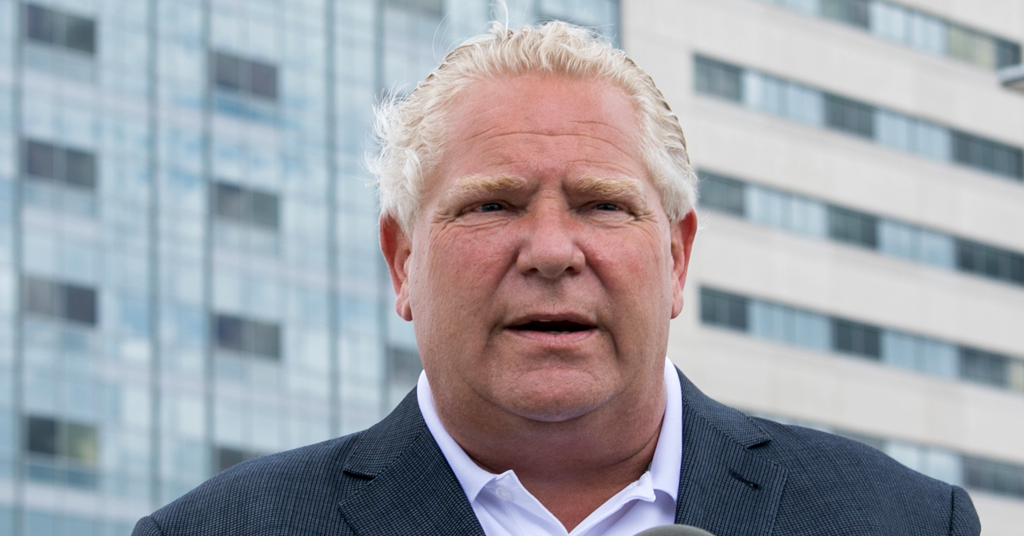
Doug Ford is Looking to Cut Costs in Healthcare Staffing, Documents Show
Ford is cutting costs at a time when Ontario’s hospitals are ‘overwhelmed’
Documents from Ontario Health show Doug Ford’s cabinet mandated the “super agency” to develop “performance measures” to find “cost savings” on staffing and equipment across the health system.
According to Ontario’s chief medical officer, the province’s health care system is currently under “extraordinary pressure” as pediatric hospitals, intensive care units and emergency departments are “overwhelmed” with patients, after years of warnings about bed shortages and staff shortages.
But according to the Business Plan for Ontario Health, the “super-agency” created by Doug Ford in 2019 to find “efficiencies” in the health system, the system is actually spending too much.
In the agency’s more recent business plan, it boasts that it is working to “quantify value-add opportunities for the health system” and “identify efficiencies, savings and value creation.” It underlines that this cost-saving program is to be done in “collaboration with the ministry.”
In the near-term, this is to start by saving funds in areas related to hemodialysis sourcing and acute care documentation. But, more broadly, it proposes to “develop a vendor scorecard program that focuses on both services and goods” to monitor “cost.”
Angela Preocanin, a registered nurse and first vice president of the Ontario Nurses Association, said the language is deeply troubling for patients and workers alike.
“This is not the time to be focused on cost savings,” Preocanin told PressProgress. “This is the time to be looking at immediate action to retain nurses and healthcare professionals. We cannot have the laser focus to be on anything other than rebuilding the capacity.”
And cutting further comes with big risks.
“It’s a vicious circle,” Preocanin said. At the moment, even in ICUs, “nurses can be looking at three critically ill patients at once.”
“When you’re working with skeletal staff, you can’t provide care to all the people who require it,” Preocanin said.“It’s a really scary time.”
Among the “deliverables” quietly mandated for the agency last year was a plan to develop “performance measures” to track new savings on ”cycle time” or the time spent per patient visit and “spend per full-time equivalent” – or spending on staff.
The Business Plan reads:
“Develop performance measures that focus on operational excellence such as cost savings, patient outcomes, cycle time, spend per full time equivalent (FTE), quality and provider satisfaction”
Joel Usher, chair of the Ontario Public Service Employees Union’s ambulance division, said the around full time equivalent spending language is also troubling.
“In the case of paramedic services, employers often use a Casual/PT/FT model,” Usher told PressProgress. Finding savings on spending “per full time equivalent,” for his union means, “the employers make efforts to realize cost savings through the deployment of casual and PT workers.”
“These workers enjoy far fewer benefits and have far less job security because they typically work under six month contracts,” Usher added.
Doris Grinspun, CEO of the Registered Nurses Association of Ontario, said the language in the documents is “shocking.”
“The government needs to decide if it wants to continue to damage the health system by depriving it of the human resources it needs,” Grinspun told PressProgress. “If we don’t have competitive compensation and competitive benefits alongside less severe and heavy workloads, patients will suffer the consequences because nurses will continue to go somewhere else.”
This, Grinspun said, is part of a pattern for Ontario Health, since its creation. “This is downloading the responsibility of the government onto an agency,” Grinspun said, “It sets the universal healthcare system up to fail by design.”
Neither Ontario Health nor the Ministry responded to requests for comment from PressProgress.
Global News reported last August that Ontario’s former Health Minister explicitly mandated the agency to cut costs across the board: “As part of the Ontario government, agencies are expected to act in the best interests of Ontarians by being efficient, effective, and providing value for money for taxpayers.”
Our journalism is powered by readers like you.
We’re an award-winning non-profit news organization that covers topics like social and economic inequality, big business and labour, and right-wing extremism.
Help us build so we can bring to light stories that don’t get the attention they deserve from Canada’s big corporate media outlets.
Donate



